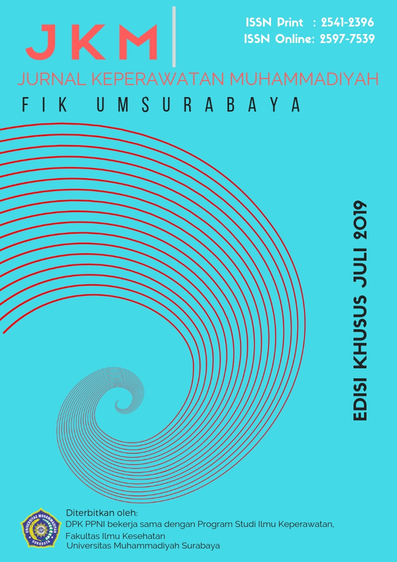Hubungan Antara Self-Care Dan Kontrol Glikemik (Hba1c) Pada Pasien Dengan Diabetes Melitus Tipe 2
DOI:
https://doi.org/10.30651/jkm.v4i2.2347Keywords:
Diabetes Mellitus, self-care, kontrol glikemikAbstract
Abstract
Introduction: Diabets Melitus (DM) is one of the degenerative diseases with chronic properties which are the main causes of cardiovascular disease, blindness, kidney failure and lower extremity amputation. The prevalence of type 2 DM will increase in low and middle income countries if there is no effective management and strategy for the treatment. Self-care DM plays a role to reduce the risk or slow the progression of complications from type 2 diabetes. DM requires HbA1c examination to assess long-term glycemic status and reduce complications. The purpose of this literature study is to review the literature on the relationship between Self-care and glycemic control in type 2 DM patients.
Methods: Literature search is done through searching scientific publications by using several databases, such as Google Scholar, PubMed with the keywords "Diabates Mellitus", "Self-care" and "" glycemic control "and getting 278 relevant articles. Articles included in the final analysis that meet inclusion criteria.
Results: Self-care has a direct effect on glycemic control in patients with DM, so self-care is highly recommended to reduce complicationsConclusion: Self-care has a direct effect on glycemic control so self-care is recommended for DM patients to reduce their risk and slow down the complications of type 2 DM.References
DAFTAR PUSTAKA
ADA, A. D. A. (2016). Standars of Medical Carein Diabetes -2016, 38. http://doi.org/10.2337/dc13-S011
Beckerle, C. M., & Lavin, M. A. (2013). Association of Self-Efficacy and Self-Care With Glycemic Control in Diabetes. Diabetes Spectrum, 26.
Bukhsh, A., Phil, M., Nawaz, S.A., Ahmed, S., Khan, TA, randomized controlled study to evaluate the effect of pharmacist-led educational intervention on glycemic control, self-care activities and disease knowledge among type 2 diabetes patients (A consort compliant study protocol
Burant. (2008). Medical management of type 2 diabetes (6th ed.). Alexaandria.
Gao, J., Wang, J., Zheng, P., Haardorfer, R., Kegler, M. C. Yz. aocheng, & Fu, H. (2013). Effects of self-care, self-efficacy, social support on glycemic control in adults with type 2 diabetes. BMC Family Practice.
Kusniyah, Y., Siswati, N., & Rahayu, U. (2010). Hubungan Tingkat Self Care Dengan Tingkat HbA1C Pada Klien Diabetes Melitus Tipe 2 Di Poliklinik Endokri RSUP DR. HASAN SADIKIN BANDUNG.
Nyunt, S. W., Howteerakul, N., Suwannapong, N., & Rajatanun, T. (2010). Self-efficacy, Self-care Behavior And Glicemic Control Among Type-2 Diabetes Patient Attending Two Private Clinics In Yangon Myanmar. Southest Asian J Trop Med Public Health, 41.
PERKENI, P. E. I. (2015). Konsensus Pengelolaan dan Pencegahan Diabetes Melitus Tipe 2 di Indonesia. Jakarta.
Skyler, J. S., Bergenstal, R., Bonow, R. O., Buse, J., Prakash, D., & Gale, E. A. M. (2009). Intensive Glycemic Control and the Prevention of Cardiovascular Events: Implications of the ACCORD, ADVANCE, and VA Diabetes Trials. JACC, 53.
Soegondo, S., Soewondo, P., & Suekti, I. (2013). Penatalaksanaan Diabetes Melitus Terpadu. Jakarta: FKUI.
Downloads
Published
Issue
Section
License
- Penulis tetap memegang hak atas karyanya dan memberikan hak publikasi pertama kepada jurnal ini yang secara simultan karya tersebut dilisensikan di bawah:Â Creative Commons Attribution-ShareAlike 4.0 International (CC BY-SA 4.0)













